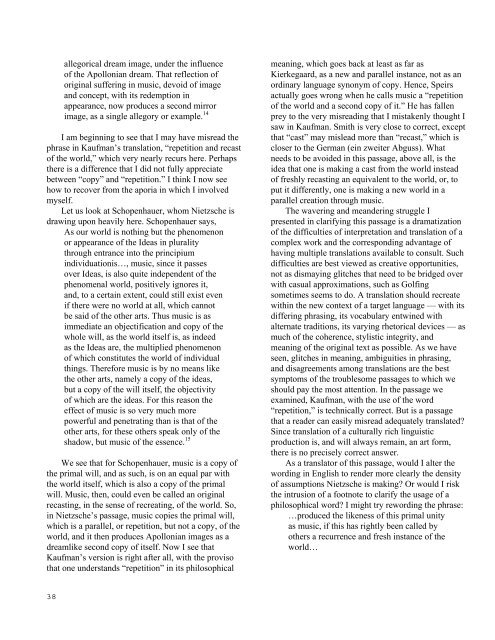their - The University of Texas at Dallas
their - The University of Texas at Dallas
their - The University of Texas at Dallas
You also want an ePaper? Increase the reach of your titles
YUMPU automatically turns print PDFs into web optimized ePapers that Google loves.
allegorical dream image, under the influence<br />
<strong>of</strong> the Apollonian dream. Th<strong>at</strong> reflection <strong>of</strong><br />
original suffering in music, devoid <strong>of</strong> image<br />
and concept, with its redemption in<br />
appearance, now produces a second mirror<br />
image, as a single allegory or example. 14<br />
I am beginning to see th<strong>at</strong> I may have misread the<br />
phrase in Kaufman’s transl<strong>at</strong>ion, “repetition and recast<br />
<strong>of</strong> the world,” which very nearly recurs here. Perhaps<br />
there is a difference th<strong>at</strong> I did not fully appreci<strong>at</strong>e<br />
between “copy” and “repetition.” I think I now see<br />
how to recover from the aporia in which I involved<br />
myself.<br />
Let us look <strong>at</strong> Schopenhauer, whom Nietzsche is<br />
drawing upon heavily here. Schopenhauer says,<br />
As our world is nothing but the phenomenon<br />
or appearance <strong>of</strong> the Ideas in plurality<br />
through entrance into the principium<br />
individu<strong>at</strong>ionis…, music, since it passes<br />
over Ideas, is also quite independent <strong>of</strong> the<br />
phenomenal world, positively ignores it,<br />
and, to a certain extent, could still exist even<br />
if there were no world <strong>at</strong> all, which cannot<br />
be said <strong>of</strong> the other arts. Thus music is as<br />
immedi<strong>at</strong>e an objectific<strong>at</strong>ion and copy <strong>of</strong> the<br />
whole will, as the world itself is, as indeed<br />
as the Ideas are, the multiplied phenomenon<br />
<strong>of</strong> which constitutes the world <strong>of</strong> individual<br />
things. <strong>The</strong>refore music is by no means like<br />
the other arts, namely a copy <strong>of</strong> the ideas,<br />
but a copy <strong>of</strong> the will itself, the objectivity<br />
<strong>of</strong> which are the ideas. For this reason the<br />
effect <strong>of</strong> music is so very much more<br />
powerful and penetr<strong>at</strong>ing than is th<strong>at</strong> <strong>of</strong> the<br />
other arts, for these others speak only <strong>of</strong> the<br />
shadow, but music <strong>of</strong> the essence. 15<br />
We see th<strong>at</strong> for Schopenhauer, music is a copy <strong>of</strong><br />
the primal will, and as such, is on an equal par with<br />
the world itself, which is also a copy <strong>of</strong> the primal<br />
will. Music, then, could even be called an original<br />
recasting, in the sense <strong>of</strong> recre<strong>at</strong>ing, <strong>of</strong> the world. So,<br />
in Nietzsche’s passage, music copies the primal will,<br />
which is a parallel, or repetition, but not a copy, <strong>of</strong> the<br />
world, and it then produces Apollonian images as a<br />
dreamlike second copy <strong>of</strong> itself. Now I see th<strong>at</strong><br />
Kaufman’s version is right after all, with the proviso<br />
th<strong>at</strong> one understands “repetition” in its philosophical<br />
meaning, which goes back <strong>at</strong> least as far as<br />
Kierkegaard, as a new and parallel instance, not as an<br />
ordinary language synonym <strong>of</strong> copy. Hence, Speirs<br />
actually goes wrong when he calls music a “repetition<br />
<strong>of</strong> the world and a second copy <strong>of</strong> it.” He has fallen<br />
prey to the very misreading th<strong>at</strong> I mistakenly thought I<br />
saw in Kaufman. Smith is very close to correct, except<br />
th<strong>at</strong> “cast” may mislead more than “recast,” which is<br />
closer to the German (ein zweiter Abguss). Wh<strong>at</strong><br />
needs to be avoided in this passage, above all, is the<br />
idea th<strong>at</strong> one is making a cast from the world instead<br />
<strong>of</strong> freshly recasting an equivalent to the world, or, to<br />
put it differently, one is making a new world in a<br />
parallel cre<strong>at</strong>ion through music.<br />
<strong>The</strong> wavering and meandering struggle I<br />
presented in clarifying this passage is a dram<strong>at</strong>iz<strong>at</strong>ion<br />
<strong>of</strong> the difficulties <strong>of</strong> interpret<strong>at</strong>ion and transl<strong>at</strong>ion <strong>of</strong> a<br />
complex work and the corresponding advantage <strong>of</strong><br />
having multiple transl<strong>at</strong>ions available to consult. Such<br />
difficulties are best viewed as cre<strong>at</strong>ive opportunities,<br />
not as dismaying glitches th<strong>at</strong> need to be bridged over<br />
with casual approxim<strong>at</strong>ions, such as Golfing<br />
sometimes seems to do. A transl<strong>at</strong>ion should recre<strong>at</strong>e<br />
within the new context <strong>of</strong> a target language — with its<br />
differing phrasing, its vocabulary entwined with<br />
altern<strong>at</strong>e traditions, its varying rhetorical devices — as<br />
much <strong>of</strong> the coherence, stylistic integrity, and<br />
meaning <strong>of</strong> the original text as possible. As we have<br />
seen, glitches in meaning, ambiguities in phrasing,<br />
and disagreements among transl<strong>at</strong>ions are the best<br />
symptoms <strong>of</strong> the troublesome passages to which we<br />
should pay the most <strong>at</strong>tention. In the passage we<br />
examined, Kaufman, with the use <strong>of</strong> the word<br />
“repetition,” is technically correct. But is a passage<br />
th<strong>at</strong> a reader can easily misread adequ<strong>at</strong>ely transl<strong>at</strong>ed<br />
Since transl<strong>at</strong>ion <strong>of</strong> a culturally rich linguistic<br />
production is, and will always remain, an art form,<br />
there is no precisely correct answer.<br />
As a transl<strong>at</strong>or <strong>of</strong> this passage, would I alter the<br />
wording in English to render more clearly the density<br />
<strong>of</strong> assumptions Nietzsche is making Or would I risk<br />
the intrusion <strong>of</strong> a footnote to clarify the usage <strong>of</strong> a<br />
philosophical word I might try rewording the phrase:<br />
…produced the likeness <strong>of</strong> this primal unity<br />
as music, if this has rightly been called by<br />
others a recurrence and fresh instance <strong>of</strong> the<br />
world…<br />
38

















